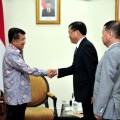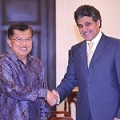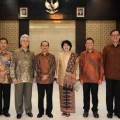Jakarta-wapresri.go.id On Thursday (Feb. 16) Prof. Dr. Dewi Fortuna Anwar, M.A. who is Deputy for Government Policy Support of the Secretariat of the Vice President was confirmed as the member of the Social Science Commission of the Indonesian Sciences Academy (AIPI).
The membership inauguration began with the inaugural lecture by Prof. Dewi Fortuna entitled “Indonesia, ASEAN, and Regional Stability” held at the auditorium of the Secretariat of the Vice President on Jalan Merdeka Selatan, Jakarta.
Opening her inaugural lecture, Dewi Fortuna Anwar outlined the success and contribution of ASEAN in maintaining regional security, peace, and stability as well as in playing its role as the major determinant of the regional order.
“The ASEAN region as a whole has been marked by a fairly harmonious relations among its members, which is very different from the atmosphere of the region before ASEAN was established. Compared to many other regions in the world, which are filled with tension such as in the East Asia, or open conflicts such as in the Middle East, Southeast Asia region today can be said to appear as an oasis of peace,” said Dewi.
Furthermore, she explained, ASEAN has a great role and benefit to Indonesia. There are, she argued, eight main reasons that made Indonesia remain committed to keep putting ASEAN as the cornerstone of Indonesia’s foreign policy that is still relevant today.
According to her, ASEAN has established and maintained the image of Indonesia as a good neighboring country in maintaining regional stability, encouraging regional harmony, becoming security buffers, contributing to the development of regional order that is autonomous, playing an important role in increasing the bargaining power for its member countries in the international fora, increasing Indonesia’s credibility in international forums, providing regional umbrella for bilateral military cooperation among its members, and playing a role in supporting economic development.
Concluding her speech, Dewi asked a fundamental question on the importance of formulating development strategies and policies of ASEAN after the organization enters the age of 50 this year.
“Has ASEAN, at its 50th anniversary, come to the end of the fourth stage of its evolution and thus should start thinking about the development of the institution and mechanisms for the next stage? This issue needs to be a discussed seriously among practitioners and observers of ASEAN so that the organization remains reliable as the main determinant of the regional order of Southeast Asian region and surrounding areas in the days to come,” she concluded.
Earlier in his speech the Head of the Secretariat of the Vice President Mohamad Oemar congratulated Prof. Dr. Dewi Fortuna Anwar for being elected as an AIPI member.
“We know that AIPI a unique [organization] containing our leading scientists. And membership in AIPI is a high recognition for the expertise of scientists. We in the Secretariat of the Vice President are feeling proud and honored of Mrs. Dewi Fortuna Anwar inaugurated as a member of AIPI,” said Mohamad Oemar.
He further hoped that in the future AIPI would provide more recommendations to the nation particularly in the formulation of national policies.
Alluding to the role of ASEAN to regional stability, Mohamad Oemar stated that ASEAN since its establishment has always sought to maintain peace as a necessary condition for the stability of its member states.
“ASEAN will and has become the most important cornerstone for Indonesia’s foreign policy. Basically, since its establishment, ASEAN has become a regional organization that supports and maintains the regional stability. It also has been a channel for negotiations on how to maintain stability for the sake of development among its member states,” he said.
To elaborate on the inaugural speech, the event was continued with a talk show hosted by Desi Anwar, a CNN Indonesia’s journalist who is also Dewi’s younger sister.
Other than Dewi, there were three other speakers, namely Jose Antonio Morato Tavares (Director General for ASEAN Cooperation, Ministry of Foreign Affairs), Adriana Elisabeth (Director of the Center for Political Research, Indonesian Institute of Sciences (LIPI)), and Philips J. Vermonte (Executive Director of the Center for Strategic and International Studies (CSIS)).
Ambassador Jose Tavares said, to maintain regional stability today, ASEAN needs to show its role for its member countries.
“What ASEAN needs to do is to really provide benefits for its member countries, as well as to retain ASEAN unity,” said Jose.
Meanwhile, Adriana Elisabeth assessed that the most fundamental aspect to maintain regional stability is to preserve national and regional security with a focus on priority issues such as the ease of doing business and human rights.
“National resilience becomes essential for each ASEAN member country. National defense is important to strengthen regional resilience. To maintain regional resilience, ASEAN countries need to jointly define the priority issues to be addressed together in the future. To me, what should be the priority today are the issues of business and human rights,” argued Adriana.
Meanwhile, Philips J. Vermonte stated that what is needed by ASEAN to maintain stability is the commitment of the leaders of the member countries.
“We need to grow the commitment and love of the current leaders of ASEAN countries to ASEAN. If the leaders feel ASEAN needs to be maintained as a regional organization, they will fight to maintain regional resilience through ASEAN,” said Philips.
Concluding the talk show, the third President BJ Habibie, who also attended the event, shared his thoughts on the success of developed countries in maintaining their stability. He told of how Germany could remain relatively stable among other European countries that are almost uprooted, such as Greece, Spain and Italy.
“Germany could remain strong and uphold its national stability since Germans are able to pass down good values that have been built since long ago [to their younger generation]. There are three main values defended by Germany. First is the same language, the second is the positive synergy of culture and religion, and the third is political will. These are the three things that need to be learned by other countries to maintain national and regional stability,” said Habibie.
Also attending the ceremony were AIPI chairman Sangkot Marzuki, AIPI secretary general Budhi M. Suyitno, AIPI’ Social Commission chairman Taufik Abdullah, Sofyan Effendi, Azyumardi Azra, and some AIPI members.







